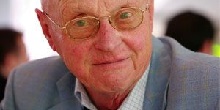Unique archives in the University of Groningen Library

The archives of the world-renowned scientific pioneer, Geert Hofstede, will be opened on the 14th of February at the University of Groningen Library in Groningen, The Netherlands. Hofstede ranks in the top 15 of the most quoted social scientists worldwide. Eleven universities have bestowed him with honorary doctorates, making him one of the most noted alumni of the University of Groningen. In 2011, he received a knighthood in the order of the Dutch Lion, the highest civil honour bestowed by the queen.
Geert Hofstede (*1928) studied Mechanical Engineering at the Technological University in Delft and received his Ph.D. in Social Psychology at the University of Groningen. In doing so, the University of Groningen became the first Dutch university to award a doctorate in social science to someone with a degree in another domain.
Based on his research as the manager of the Personnel Research Department of IBM Europa, he developed the 6D model of national culture. This model is widely acknowledged as keystone for internationalization. His book, Cultures and Organizations: Software of the Mind has been translated into 26 languages. It is a standard work in the body of knowledge in the field of internationalization, studied by students all over the world. Through factor analysis, Hofstede ranked different countries of the world across six cultural dimensions: Power Distance, Collectivism vs. Individualism, Masculinity vs. Femininity, Uncertainty Avoidance, Long-term vs Short-term Orientation, and Indulgence. He established correlations between these dimensions and for example, economic growth, procreation, relations between the sexes, and indulging ourselves.
His work has received acclaim, but also criticism. Hofstede has always invited the debate about his work: "If no one disagrees, you have no message', is his stance. He also strived for his work to be practically implemented and there is now a world-wide network of consultants who work based on his model.
The opening of his archives is organized by the students of the Master of International Communication. They chose “love” as the theme for the opening and not just because of Valentine’s day. Geert Hofstede dedicated much of his time to the peace movement. He saw his task in life as ‘’… to make people aware of the effect of people’s background for communication. And therefore, to contribute to understanding between groups of people.’’
The Hofstede archives as a special collection
The Hofstede archives will be included in the “special collections” department of the library . It is the largest one the library stores in its vault. It includes his scientific documentation but also his personal documentation, all of his publications, and audio-visual material. The Special Collections of the University Library of Groningen comprise, among others, collections of manuscripts, incunabula, papyri, printed works up to 1900, newspapers, pamphlets, bibliophile editions, letters, personal archives, historical atlases, and maps.
| Last modified: | 14 January 2021 2.45 p.m. |
More news
-
16 April 2024
UG signs Barcelona Declaration on Open Research Information
In a significant stride toward advancing responsible research assessment and open science, the University of Groningen has officially signed the Barcelona Declaration on Open Research Information.
-
02 April 2024
Flying on wood dust
Every two weeks, UG Makers puts the spotlight on a researcher who has created something tangible, ranging from homemade measuring equipment for academic research to small or larger products that can change our daily lives. That is how UG...
-
18 March 2024
VentureLab North helps researchers to develop succesful startups
It has happened to many researchers. While working, you suddenly ask yourself: would this not be incredibly useful for people outside of my own research discipline? There are many ways to share the results of your research. For example, think of a...

